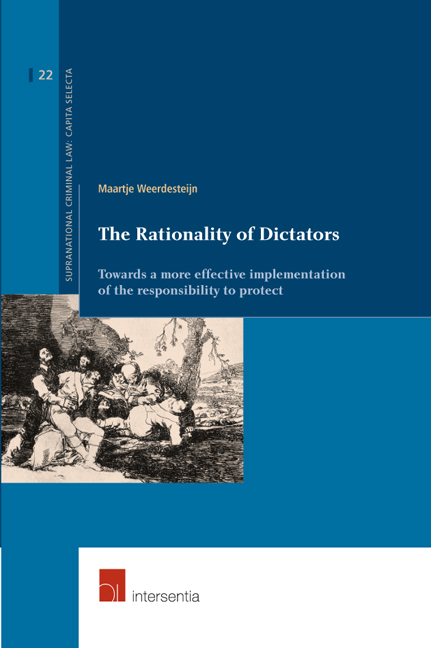 The Rationality of Dictators
The Rationality of Dictators from Part I - The Theory
Published online by Cambridge University Press: 28 September 2018
INTRODUCTION
In line with the argument that the state should not be viewed as a black box, Max Weber likewise argued that collective entities need to be opened up to analyse the individuals who constitute them. On the one hand, he noted in his seminal work Economy and Society that sometimes it may be necessary for practical reasons to treat social collectivities as if they were individuals (Weber, 1964, p. 101). On the other hand, he argued that ‘for the subjective interpretation of action in sociological work [social collectivities such as states, associations and business corporations] must be treated as solely the resultants and modes of particular acts of individual persons’, adding that ‘for sociological purposes there is no such thing as a collective personality which “acts”’ (Weber, 1964, pp. 101- 102). Although most sociologists tend to view the task of the sociologist as lying with the analysis of what Levine calls ‘supraindividual’ formations, according to Weber sociology should seek to understand and interpret individual social action (emphasis in original 2005, p. 101). His types of social action have usually been discussed in relation to his work on rationality which has been highly influential (Levine, 2005, p. 102). Some scholars go as far as to designate Weber as an early forbearer of the rational choice approach (Norkus, 2000, p. 259), yet despite the influence he may have had on the development of rational choice, there is much to be gained by incorporating more of Weber's ideas into the contemporary debate on individual rationality.
Rational choice is sometimes said to be a multilevel enterprise with an important focus on macro level outcomes, leaving the analysis of individuals to decision-making theory which highlights the cognitive and psychological factors which influence human action (Hechter & Kanazawa, 1997, p. 192; Kiser & Hechter, 1998, pp. 802-803; Mintz & DeRouen, 2010, pp. 3-6). However, this dichotomy between rational choice and decision-making analysis as mutually exclusive paradigms is unnecessary. It is important to acknowledge that the perfectly rational decision maker is an ideal type.
To save this book to your Kindle, first ensure [email protected] is added to your Approved Personal Document E-mail List under your Personal Document Settings on the Manage Your Content and Devices page of your Amazon account. Then enter the ‘name’ part of your Kindle email address below. Find out more about saving to your Kindle.
Note you can select to save to either the @free.kindle.com or @kindle.com variations. ‘@free.kindle.com’ emails are free but can only be saved to your device when it is connected to wi-fi. ‘@kindle.com’ emails can be delivered even when you are not connected to wi-fi, but note that service fees apply.
Find out more about the Kindle Personal Document Service.
To save content items to your account, please confirm that you agree to abide by our usage policies. If this is the first time you use this feature, you will be asked to authorise Cambridge Core to connect with your account. Find out more about saving content to Dropbox.
To save content items to your account, please confirm that you agree to abide by our usage policies. If this is the first time you use this feature, you will be asked to authorise Cambridge Core to connect with your account. Find out more about saving content to Google Drive.